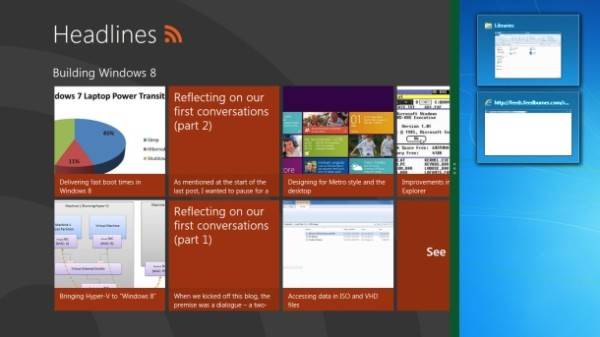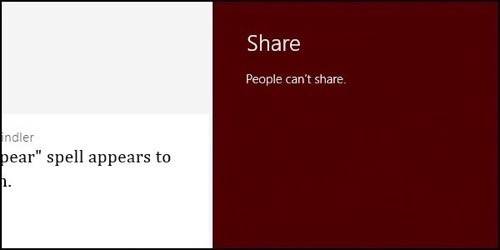Raise your hand if you want a Windows 8 tablet just so you can use that cool new Start screen. Wait, first put your iPad down. Now raise your hand.

After two public previews of Microsoft’s new Windows 8 technology, the one major difference we’ve seen thus far in what it does, compared to its predecessors, comes from a few of its cloud-reliant apps, including Pictures. You can store your pictures on Microsoft’s SkyDrive and have them automatically sync across your (Windows-branded) devices. That’s very nice, but no longer new. Come October, it may even be old hat. ReadWriteWeb asked the Panel of Esteemed Grown-ups (who reminded me to say thank you for the esteem) to deduce what kinds of functionality might make you consider purchasing a Windows 8 device, whether or not you have an iPad. Joining us for this round are (left to right):
Ross Rubin, Executive Director and Principal Analyst, NPD Connected Intelligence
Al Hilwa, Program Director for Applications Development Software, IDC
Sarah Rotman Epps, Senior Analyst for Consumer Product Strategy, Forrester
Carmi Levy, Correspondent, Yahoo Finance Canada; Contributing Technology Analyst, CTV
“I think the PC will be becoming more complex with Windows 8 or not,” says my long-time friend and colleague Carmi Levy. “So Microsoft is simply recognizing the trend before it actually takes root… The PC as we know it is going to become a less conventional animal as 2012 progresses and transitions into 2013. And that’s really what Microsoft is positioning itself for, that Windows 8 becomes the acrobat of the technology world. No longer just being a PC operating system, but an OS for the tablet and everything in-between. And as we see more hybrid designs, starting with the Ultrabook reference point but branching out from there, taking root into 2013, Windows 8 will then be more optimally positioned than anything else, from any competing vendor, to take advantage of that transition.”

Should Metro Be “Windows Lite?”
Okay, so Microsoft puts itself in position. But to do what? This is where the new operating system becomes simultaneously as multi-faceted as Medusa and as homogenous as, say, Mitt Romney. What will sell Windows 8 to a new class of buyers? IDC’s Al Hilwa believes the answer depends on which new class of buyers you’re referring to.
“Depending on which Windows form factor we are talking about, the killer app may be different,” states Hilwa. “Office would surely differentiate PC tablets from the iPad, all things being equal. What might get enterprise buyers to upgrade may be more about how Microsoft’s management stack can help smooth upgrade processes and reduce TCO. In the long term, a massive applications evangelism drive from Microsoft can help bring the productivity of touch and gesture applications to the right places in the enterprise where they bring added value.”
“Microsoft hasn’t nailed productivity on this new device, and I’m not sure that they will.”
Sarah Rotman Epps
Senior Analyst for Consumer Product Strategy, Forrester
While iPhone and later iPad apps may continue to serve different use-case scenarios, Hilwa points out that the way iOS apps work has forced Windows developers to think about their current usage models in a different way. The simpler, single-stream, goal-oriented approach – especially compared with the drill-down dialog box-driven style exemplified by Microsoft Management Console – with greater reliance on context and what on-board sensors reveal, makes the “mobile style” of app development a compelling alternative, even for apps that are not, by definition, mobile.
“Ultimately, the productivity and richness of such a style will make inroads into application development everywhere,” he predicts. “I’m not saying that AutoCAD is going to necessarily become an iPad app… But let’s say you wanted to create very simple CAD software that allows people to remodel a home, add a room, lay out furniture. I completely see that being done with a tablet style and touch orientation. You have to rethink that application – it probably isn’t easy to start with a CAD program [leading] to one of those. Over time, you may find that the level of user who may need to, for example, examine and read a CAD diagram and make minor alterations, can use a tablet, but maybe not the full-on capability that requires the 30-inch screen.”
NPD’s Ross Rubin, too, sees the Win8 adoption problem as multi-faceted.
“If you’re an experienced Windows user, the challenge for Microsoft is to get consumers who are used to that interface to embrace Metro,” remarks Rubin. “Many of them will likely be more drawn to using a touch-enabled device which, as Microsoft admits, is the primary mode of interaction for which [Metro] was designed. If you are new to a Windows experience, and you want a pure tablet experience, it’s in some ways the opposite challenge. Microsoft makes the case that you can create as pure a touch-designed experience as you could have on an iPad or an Android tablet. And over time, as more apps support Metro, that will get easier for Microsoft to make that case.”
Rubin notes that Microsoft has not said, and may not ever say, that it wants all Windows apps to become Metro apps. Indeed, there may be a degree of Desktop-based functionality that will not translate into the Metro experience, even if it can be rendered using the new WinRT library. But rather than making a “lite” version of heavy-duty apps and market them together, as IDC’s Al Hilwa projects, NPD’s Rubin foresees the possibility that heavy-duty apps vendors move completely to the “lite” version, abandoning their full-scale versions and leaving behind some functionality in the process. “It’s very similar to what happened in the transition from character-based interfaces to GUI applications. A lot of the early graphical interfaces lacked some of the power and features of their DOS predecessors; but over time, they were able to build something much more capable, on a much more approachable foundation.”

Extend First, Embrace Second
Forrester’s Sarah Rotman Epps looks to her company’s survey data to give her insights. One study she cites asked today’s tablet users what they’re doing right now, to determine whether the characteristics are as fundamental as they’re made out to be. And she says, not really.
“The number one thing that they do on a tablet is browse the Web. Number two is e-mail, number three is playing games. There are a lot of media activities down the list, and longer down the tail, managing finances, editing documents, and so on. So if consumers are seeing tablets as just as good as, if not better than, many of the activities they used to do on the PC, they’re a reasonable option,” relates Epps.
Epps uses a Windows Phone 7 device every day, and likes it. But it would not have made sense, she believes, for Microsoft to produce a Windows Phone-based tablet instead, and HTML5 is one big reason. Mobile apps are moving toward HTML5 as a central platform. That works against Windows Phone 7, whose future had already been bet on Silverlight – which ended up being a losing bet. Just as technical reasons prevent consumers from embracing the BlackBerry PlayBook today, even though they don’t really understand (or need to) what those reasons are, Epps believes consumers wouldn’t stick around to follow the explanation of why certain mobile apps wouldn’t run on Silverlight.
“Microsoft had no product that was ready for touchscreen tablets, and they hold themselves to a very high-quality standard,” she says, “because one of their big value propositions is that their software works with all the old printers and cameras and mice and peripherals that people already invested in.”
So does the killer app for a Windows 8 tablet become Internet Explorer 10? “Microsoft hasn’t nailed productivity on this new device,” Forrester’s Epps responds, “and I’m not sure that they will.”
Carmi Levy clearly disagrees. He perceives plenty of opportunity for Microsoft to establish Windows 8 as the next logical upgrade to Windows 7 for those folks who are already using PCs. That standard was all that was necessary to declare Win7 a success over Vista, after all. With that matter settled, Win8’s ability to attract tablet users would be “the icing on the cake,” he says.
“The die is cast, not only for this version of Windows, but most likely for at least the next version as well. There’s going to be this duality. Sure, Microsoft could expend resources trying to improve the continuity between Metro and the classic Desktop, or they can invest resources in trying to make Metro better and more versatile, and a better option for the kinds of applications they want to attract. So Microsoft is being forward-looking; they’re not investing heavily in sprucing up the legacy. And in that respect, they are being more Apple-like.”
Ross Rubin
Executive Director and Principal Analyst, NPD Connected Intelligence
“Once you’ve got Windows on a desktop or laptop, does it make more sense to extend that capability to a Microsoft co-branded product instead of an Apple iPad?” Levy asks. Put another way, the PC is Microsoft’s established beach head, and users may see themselves preferring to extend Windows’ territory onto tablets that are purchased in addition to PCs (because they are, and always will be, distinct devices), rather than adopting a tablet device that’s divided from the PC.
“The fact that [Win8] comes pre-loaded on an HP Ultrabook that you buy at Best Buy isn’t going to get the headlines, but it’ll certainly generate the numbers,” he argues. “Look, Windows 7 sold 525 million copies since it was released. Those are huge numbers, but you don’t see them generating headlines. Microsoft – like IBM before it – has become a leviathan that does most of its business in the shadows. And that’s perfectly fine as far as shareholders are concerned. As long as you’re profitable and consistently growth focused, nothing else matters, headlines or not. [But] in order for Microsoft to stay above the radar of most consumers, it has to have something that’s perceived as more than a commodity. And as long-demand for conventional PCs and laptops flatten out, Microsoft either makes a transition to tablets and other form factors, or it will continue to lose not just market share but mindshare. It has to maintain a legacy business and continue to grow it, but it also has to carefully transition off of it in a way that Apple never had to do, because it never had that degree of PC legacy.”

















